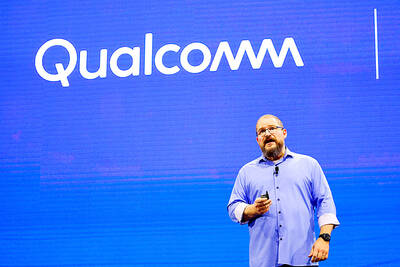Taiwan Thinktank (台灣智庫) chairman Chen Po-chih (陳博志) yesterday called comments about China-bound investments by former United Microelectronics Corp (聯電) chairman Robert Tsao (曹興誠) "biased."
"[Tsai] can't see the forest for the trees," Chen said.
He said that not all China-based businesses turned a profit there, and some Taiwan business- people have gone bankrupt after their China-bound investments failed.
It's not a question of whether Taiwan chooses to open or close up trade exchanges with China, he said, adding that the Taiwanese government should manage its cross-strait trade relations with sophistication while respecting the people's right to self-determination.
Joined by former Democratic Progressive Party (DPP) chairman Shih Ming-teh (
Tsao further urged the Tai-wanese government to allow its people to work freely in China, saying the government and the people -- not China-based businesses -- should take full responsibility if the nation's unemployment rate deteriorates.
In response to Tsao's comments, Chen yesterday said that Gou's status as the richest man in Taiwan, on the contrary, proves that the local government does not impose too many restrictions on cross-strait trade and has obviously not hindered Taiwanese businesses' expansion into China.
Chen said that he agreed with Tsao that both countries should strive to maintain a peaceful relationship although he disapproves of Tsao's "cross-strait peaceful coexistence law."
To believe that such a law would solve the fundamental problems between Taiwan and China or that China would really honor its word is naive, he said. He also said it is important for Taiwan to reduce its economic dependence on China.

Intel Corp yesterday reinforced its determination to strengthen its partnerships with Taiwan’s ecosystem partners including original-electronic-manufacturing (OEM) companies such as Hon Hai Precision Industry Co (鴻海精密) and chipmaker United Microelectronics Corp (UMC, 聯電). “Tonight marks a new beginning. We renew our new partnership with Taiwan ecosystem,” Intel new chief executive officer Tan Lip-bu (陳立武) said at a dinner with representatives from the company’s local partners, celebrating the 40th anniversary of the US chip giant’s presence in Taiwan. Tan took the reins at Intel six weeks ago aiming to reform the chipmaker and revive its past glory. This is the first time Tan

Qualcomm Inc is strengthening its partnerships with Taiwan Semiconductor Manufacturing Co (TSMC, 台積電) and original design manufacturers (ODMs) in Taiwan as it expands its presence in the artificial intelligence (AI) computer market, CEO Cristiano Amon said in Taipei yesterday ahead of the annual Computex trade show. “Historically we’ve always been a very big customer of TSMC, and we continue to be,” Amon said during a media Q&A session. “For chip manufacturing, we’re among the largest fabless [semiconductor designers],” he said, noting that Qualcomm, a leading provider of mobile and AI-enabled chipsets, ships about 40 billion components every year, with TSMC being

‘FAILED EXPORT CONTROLS’: Jensen Huang said that Washington should maximize the speed of AI diffusion, because not doing so would give competitors an advantage Nvidia Corp cofounder and chief executive officer Jensen Huang (黃仁勳) yesterday criticized the US government’s restrictions on exports of artificial intelligence (AI) chips to China, saying that the policy was a failure and would only spur China to accelerate AI development. The export controls gave China the spirit, motivation and government support to accelerate AI development, Huang told reporters at the Computex trade show in Taipei. The competition in China is already intense, given its strong software capabilities, extensive technology ecosystems and work efficiency, he said. “All in all, the export controls were a failure. The facts would suggest it,” he said. “The US

NEW PRODUCTS: MediaTek has been diversifying its product lines to minimize operational risks as mobile chips remain the company’s biggest revenue source MediaTek Inc (聯發科), the world’s biggest supplier of smartphone chips, yesterday said the tape-out process for its first 2-nanometer chip would take place in September, paving the way for volume production of its most advanced chip, likely to be its next-generation flagship smartphone chip, around the year-end at the earliest. MediaTek has been leveraging advanced process technologies from its foundry partner, Taiwan Semiconductor Manufacturing Co (TSMC, 台積電), to build its flagship mobile phone chips, a segment it once relinquished and then recovered four years ago as it released its Dimensity series. In the semiconductor industry, a tape-out refers to the